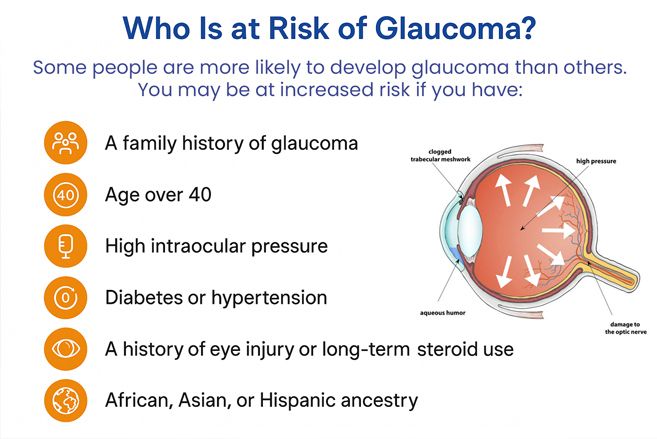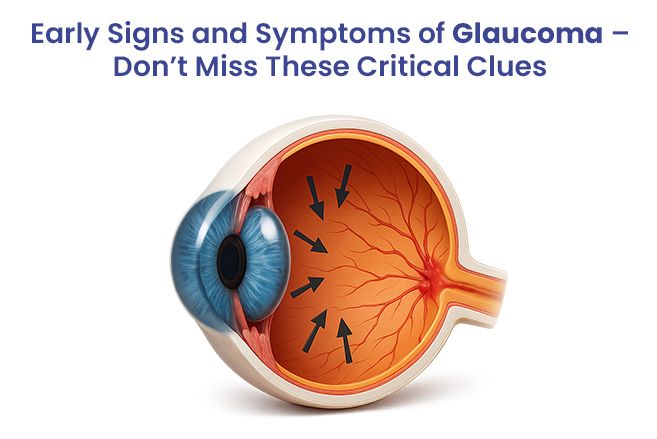Early Signs and Symptoms of Glaucoma | Know the Warning Signs to Protect Your Vision
Glaucoma can damage your vision before you realize anything is wrong. You may not feel pain or see obvious symptoms at first. But while your eyes seem fine, glaucoma can quietly damage the optic nerve and lead to permanent vision loss.
Many people ignore small changes in their vision. By the time they seek help, the damage is often advanced. That’s why spotting the earliest signs of glaucoma is so important.
At Kenia Eye Hospital, we help patients protect their vision through early glaucoma diagnosis and expert care. Our trusted glaucoma specialists use modern testing and a patient-first approach. It’s the reason many people trust us as their choice for the best eye hospital in Mumbai.
Curious about what these glaucoma early signs look like? Keep reading to learn how to spot the first symptoms of glaucoma, what they mean, and how early action can make all the difference.
Signs and Symptoms of Glaucoma That Deserve Your Attention
Glaucoma Symptomscan be slow and subtle. The changes may not feel alarming at first, but they can be indicators of something deeper happening in your eyes. Here are the critical clues to be aware of:
1. A Gradual Change in Side Vision
This is often the first and most telling sign of open-angle glaucoma. You might find it difficult to notice things to the side or bump into objects more frequently. A visual field test during a routine eye exam can detect this loss long before you do.
2. Slight Blurriness or Hazy Vision
Your vision may become slightly foggy, particularly when focusing on screens or reading. This can feel minor at first but may be an early symptom of optic nerve damage.
3. Halos or Rings Around Lights
You may see faint rings or glow around lights, especially at night. This can be a sign of rising intraocular pressure.
4. A Mild Ache, Discomfort or Pressure in the Eyes
A mild, dull ache around your eyes or forehead may suggest ocular hypertension, a key risk factor for glaucoma
5. Redness or Irritation
While redness can happen for many reasons, if it’s persistent or accompanied by other symptoms, it could point to glaucoma.
6. Nausea or Headache with Eye Pain
These symptoms are more commonly seen in angle-closure glaucoma, which can develop suddenly and may require immediate treatment.
7. Frequent Changes in Your Glasses Prescription
Needing new glasses more often than usual could be a clue that your optic nerve is under stress.
If you are noticing any of these clues or even just feeling unsure it’s always worth getting your eyes checked. Understanding the Glaucoma causes early is the first step to protecting your vision.
Types of Glaucoma and How They Differ
Not all glaucoma is the same. Different types affect the eye in different ways, and the symptoms can vary depending on how quickly the pressure builds up and how sensitive your optic nerve is.
Here are the main types of glaucoma you should know:
Open-Angle Glaucoma
This is the most common type. It develops slowly over time and often shows no obvious symptoms in the beginning. The drainage angle remains open, but the fluid doesn't flow out properly, which raises eye pressure. Many people don’t realize they have it until peripheral vision starts to fade.
Angle-Closure Glaucoma
This type comes on more suddenly. The drainage angle in the eye becomes blocked, causing a rapid rise in eye pressure. It can cause symptoms like severe eye pain, blurred vision, redness, and even nausea. This is a medical emergency and needs immediate treatment.
Normal-Tension Glaucoma
Even when eye pressure is within the normal range, optic nerve damage can still occur. Experts believe poor blood flow to the optic nerve or other underlying factors may contribute. This type is harder to detect without regular screening.
Congenital Glaucoma
This rare form appears at birth or early in life. It’s caused by an abnormal development of the eye’s drainage system. Symptoms can include cloudy eyes, light sensitivity, and excessive tearing. Early diagnosis and treatment are essential.
Each type of glaucoma progresses differently, so understanding these differences helps guide the right Glaucoma treatment and testing approach.

How Glaucoma Is Diagnosed?
The only way to catch glaucoma early is with a detailed eye exam. At Kenia Eye Hospital, we use advanced diagnostic techniques to detect even the smallest changes before vision is affected.
Here are some of the key tests we perform:
-
Tonometry This test measures the pressure inside your eye (intraocular pressure), which is one of the most common glaucoma risk factors.
-
Visual Field Testing We check for blind spots or subtle changes in your side (peripheral) vision that may indicate early optic nerve damage.
-
OCT (Optical Coherence Tomography)This scan provides a high-resolution image of your optic nerve, allowing us to detect early signs of damage that you can’t feel or see.
-
GonioscopyThis test lets us examine the drainage angle of your eye, which helps determine the type of glaucoma and the most effective treatment approach.
These tests are quick, painless, and essential for early detection. Our glaucoma specialist in Mumbai ensures you feel comfortable and informed every step of the way. If you are at risk or even just due for a check-up we’re here to help.

Why Choose Kenia Eye Hospital for Glaucoma Treatment in Mumbai?
Expert care. Advanced diagnostics. Personalized glaucoma treatment at one of the most trusted Eye Hospitals in Mumbai.
-
Leading Glaucoma Specialists in Mumbai – Our team includes experienced glaucoma experts who offer early detection, personalized treatment, and long-term management for every patient.
-
Advanced Diagnostic Technology We use high-precision tests like OCT, visual field analysis, tonometry, and gonioscopy to diagnose glaucoma before vision is lost.
-
Complete Range of Glaucoma Treatment Options From eye drops and medications to laser therapy and surgery, we offer everything under one roof to manage the condition at every stage.
-
Decades of Expertise With years of specialized experience, our ophthalmologists are trusted by thousands of families for compassionate and accurate glaucoma care.
-
Trusted Eye Care Facility in Mumbai Recognized as a best eye care hospital in Mumbai, Kenia Eye Hospital is known for quality care, transparency, and positive outcomes.
-
All-In-One Convenience From diagnosis to follow-up, all care is handled in-house, saving you time and giving you peace of mind.
-
Flexible Appointments We offer easy scheduling, including evening and weekend slots, to make your glaucoma care as convenient as possible.
Don’t Ignore Glaucoma Signs - Take Action Now!
If you have noticed any of the glaucoma signs mentioned above or if you are over 40 and haven’t had a recent eye exam , now is the right time to act. Glaucoma doesn't always feel urgent, but catching it early makes all the difference.
Kenia Eye Hospital in Mumbai is here to support you every step of the way, whether you are seeking answers, reassurance, or expert treatment.
Contact us today to schedule your eye test or consultation with a leading glaucoma specialist in Mumbai .
Frequently Asked Questions
Q. What are the first symptoms of glaucoma?
Most people don’t notice symptoms in the early stages. You may first experience a slight loss of peripheral vision, mild blurriness, halos around lights, or a feeling of pressure in the eyes.
Q. Can glaucoma occur even when eye pressure is normal?
Yes. In normal-tension glaucoma, damage to the optic nerve can happen even when intraocular pressure (IOP) is within the normal range. Regular screening is the only way to detect it early.
Q. What causes glaucoma to develop?
Glaucoma causes include increased eye pressure, poor fluid drainage, family history, aging, diabetes, long-term steroid use, and previous eye injuries. These factors gradually damage the optic nerve.
Q. How often should I get screened for glaucoma?
If you're over 40 or have risk factors like family history or ocular hypertension, get a full eye exam every year. This should include tonometry, visual field testing, and an OCT scan.
Q. Will glaucoma cause blindness?
Glaucoma can lead to vision loss or blindness if left untreated. With early diagnosis and consistent glaucoma treatment, most patients can preserve their sight and manage the condition effectively.
Q. Does glaucoma affect children?
Yes, though it’s rare. Congenital glaucoma is present at birth and can cause cloudy eyes, light sensitivity, or excessive tearing. Early treatment is critical to protect vision in children.